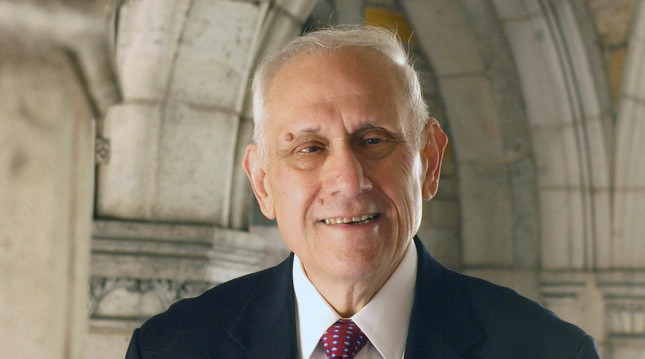
Michael Marsland

Michael Marsland
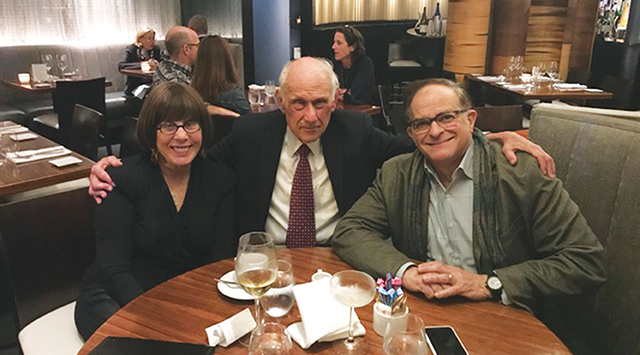
Donald Kagan (center) with Penelope Laurans (left) and former dean of undergraduate education Joseph Gordon ’78PhD.
View full image

Donald Kagan (center) with Penelope Laurans (left) and former dean of undergraduate education Joseph Gordon ’78PhD.
View full image
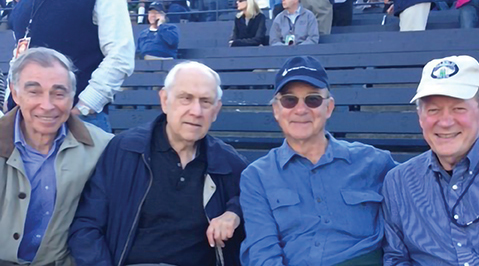
At a football game, left to right, former vice president Bruce Alexander ’65, Kagan, former deputy provost Charles Long, and deputy provost Lloyd Suttle.
View full image

At a football game, left to right, former vice president Bruce Alexander ’65, Kagan, former deputy provost Charles Long, and deputy provost Lloyd Suttle.
View full image
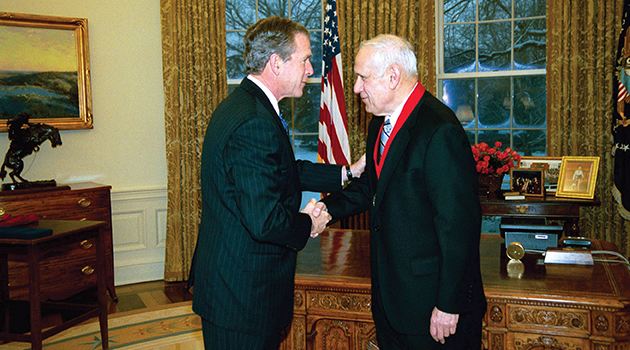
The White House
President George W. Bush ’68 awarded Kagan the National Medal for the Humanities in 2002.
View full image

The White House
President George W. Bush ’68 awarded Kagan the National Medal for the Humanities in 2002.
View full image
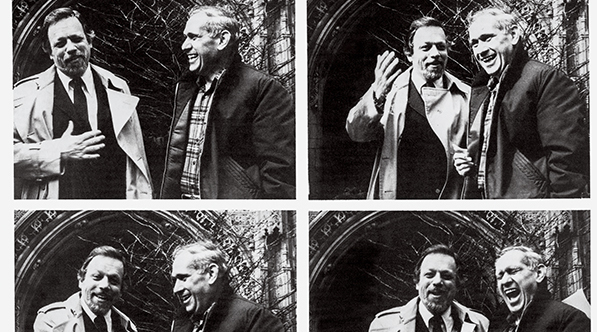
Yale Banner
A series of photos of Kagan with then-president A. Bartlett Giamatti ’60, ’64PhD, appears in the 1981 Yale Banner.
View full image

Yale Banner
A series of photos of Kagan with then-president A. Bartlett Giamatti ’60, ’64PhD, appears in the 1981 Yale Banner.
View full image
A university should contain multitudes—most especially, multitudes of opinions. A campus that lacks differing views may stagnate intellectually. At worst, it could freeze into lockstep agreement, in which no one deviates from the approved dogma and difficult questions can’t be asked out loud.
Donald Kagan (1932–2021), a Sterling Professor of Classics and History whose specialization was ancient Greece, was a bulwark against lockstep agreement. As a conservative on a fairly liberal campus, he wasn’t shy about speaking his mind to colleagues. He argued vehemently and often, and never budged an inch. (He himself said, “There are places in this university where a motion to wish me a happy birthday would get a close vote.”) In his 40-plus years on the faculty, Kagan saw the campus change in many ways, and he didn’t like all he saw. In his farewell lecture, he claimed that during his decades at Yale, students’ principles had deteriorated, because “a firm belief in the traditional values and the ability to understand and the willingness to defend them are rare. Still rarer is an informed understanding of the traditions and institutions of our Western civilization and of our country.”
But he was no dour whiner. In conversation, he was witty and down to earth. And I doubt he ever levied his strongest views against individual students or staff, unless he knew them well or there was a serious quarrel. Early in my tenure as editor of this magazine, he and I discussed the recent thefts of an undergrad conservative magazine from the college dining halls. I agreed it was disgraceful and told him that the same thing had happened to me when I was a senior at Yale. He was immediately interested and asked what the magazine was about. When I replied, “Feminism,” he merely said—and I heard the tinge of disappointment—“Oh.”
For all his political disillusionment with Yale, Kagan loved the place. He also loved—or rather, adored—Yale sports; he even served for a year as acting director of athletics. He was a football addict, and he and Vincent Scully ’40, ’49PhD, who were absolute political opposites, sat near each other at almost every game to roar and cheer together for the Bulldogs.
Above all, Kagan was a brilliant teacher. He mesmerized students in his lecture classes, drawing crowds that many other professors must have envied. He was just as skillful with his small-group seminars, but in a different direction: he drew the students out, encouraging discussion and then letting it flow without controlling it, until it was time to move on. Author and journalist Joanne Lipman ’83 says, “When I look back at my time at Yale, there are maybe half a dozen courses I still think about on a regular basis, and he would be at the top of that list.” Eric Simpson ’11, an arts critic and fundraising professional now studying at the School of Management, was struck both by the kindness Kagan showed his students and “the intellectual respect he had for us. The general expectations he had of his students were so high.” Simpson stresses that those expectations weren’t delivered with demands, but rather with confidence in what the students could achieve. Kagan’s attitude, he says, was: “You’re all intelligent young people.”
In the following pages, former students and colleagues remember Donald Kagan.—Kathrin Day Lassila ’81, Editor
A meeting of minds
By Paul Kennedy
When I arrived at Yale from the UK in the summer of 1983, that organizing genius Henry Turner (master of Davenport, professor of German history) had arranged that I would have my teaching office in Davenport’s main courtyard. After I’d taken the keys from Henry and gone off to place my books on the room’s lovely oak shelves, I remember that he had said, “You will shortly get a visit from a rather unusual colleague of ours, who is however one of your great fans; I think it will be all right. His name is Kagan.” I had hardly filled one bookshelf when there was a rat-tat-tat on my office door and a voice saying, “Can I come in?”
And in he came, warmly, swiftly, waving a greeting, and also waving a book of mine, a fairly recent tome entitled The Rise of the Anglo-German Antagonism: 1860–1914. “It’s great that you’re now at Yale,” he enthused, “and I just can’t wait to talk about the Kaiser’s navy and the Dreadnought battleship. Let’s go and eat something at Yorkside Pizza.” So off we went. That was Don. His interest in historical rivalries, great leaders, failed strategies, war and peace, flowed over from his own stamping ground of the Peloponnesian War into every other age of strife, but especially the great world wars. I had a teaching partner, a colleague.
What a colleague to have! He was the warmest admirer of your writings, the most ingenious defender of our research programs, a fierce critic of my views of America’s Middle East policies, a wonderful co-teacher of our military history classes . . . all of the above. When, in his retirement and COVID isolation, I would remind him of all this, he would brighten up and say: “Yes, we got things done!”
The real truth was, he got things done; he stirred the pot, went against the grain, infuriated, and inspired. Yale was the greater for having him here for 40 years.
Paul Kennedy is the J. Richardson Dilworth Professor of History, Director of International Security Studies at Yale, and Distinguished Fellow of the Brady-Johnson Program in Grand Strategy.
“Born to be a teacher”
By Katherine Epstein ’04
Don Kagan was born to be a teacher. As an undergrad at Yale, I had the good fortune to take two classes with him, one a lecture and the other a seminar. Many have testified to his abundant gifts as a lecturer, but he made an even bigger impression on me as a seminar leader.
He had a distinctive style. Each class, he had a few students do a short paper on an assigned topic. He began by questioning those who had written the papers, then gradually broadened the discussion to draw in others. The conversation never felt like it was too regimented or, as frequently happens in seminars, aimless. In retrospect, I think he must have had a handful of points that he wanted to be sure to cover in each class, but he balanced his mental map with a willingness to explore interesting byways and tangents as they arose. It takes immense skill to steer a seminar discussion between the poles of rigidity and chaos, and although I’ve had some wonderful teachers in my life, I’ve never seen anyone do so more skillfully than he did.
When it came to his public persona, no one ever accused him of being a shrinking violet, but as a teacher, his demeanor wasn’t intimidating—he was professional, formal, and very funny. One wanted to perform well in his class because he combined seriousness of purpose with high standards, and it seemed that there was nowhere else he’d rather be. Yale has lost one of its finest.
Katherine Epstein is an associate professor of history at Rutgers University–Camden.
No compromises
By Penelope Laurans
Don liked strong women: his mother came alone from Lithuania with Don in tow, not knowing a word of English. She worked at first in a pipe factory. He had a beloved teacher, Meta Elizabeth Schutz at City College, who was his role model—an intellectual historian of the ancient world, rigorous and tough as nails, who inspired him to be a classical historian. And then of course there was his adored wife, Myrna: a teacher, writer of history, and an able and strong woman, with views as sharp as his own. It’s not hard to imagine discussion at the family dinner table with their two sons, Bob ’80 and Fred ’91, fierce polemicists and debaters in their own right.
Don could have charm, especially (though not only) as an engaging teacher, but compromise was not in his lexicon and enemies were not a problem for him. I once pointed out to him that Pericles’ political strength came from his staying power, his ability to remain First Citizen of Athens for over 40 years, but I got nowhere. We had shared points of agreement, and I cared for him very much, even more as time went on; but when we disagreed I fought with him tooth and nail, hammer and tongs. Our relationship did not alter, but on the other hand, he never changed his mind. It was like going up against the Berlin Wall.
One other thing: he was one of a number of faculty—Bart Giamatti, Harold Bloom, John Hollander, Rick Levin—who were/are wizards on baseball statistics and personalities. And no one could top either Giamatti or Kagan on recountings and dramatizations of the movies they loved. If only I had a recording of those.
Penelope Laurans, a senior adviser at Yale, was head of Jonathan Edwards College from 2009 to 2016.
“The entire football team turned up”
By Ramsay MacMullen
Being charged by history and classics to find a Greek partner to myself in Roman history, I chaired a little committee to find such a person, and persuaded my colleagues that it would be wise to look particularly for someone who could strengthen the classics department’s appeal to the undergraduate body. It was easy to spot the winner.
Don Kagan proved at Yale—his teaching platform from 1969—what he had amply demonstrated at Cornell: a spectacular ability to dramatize and to interest undergraduates, especially in ancient Greek history. Every year in his survey course, he rose to a peak performance on warfare as it had been mastered by the Athenian and Spartan heavy infantry. Half the football team turned up at the back of the room for the joy of it. More seriously, whatever history has to offer as a study was there made plain and carried over into wider audiences and more students’ choices of study. At Yale, his beneficiary, perhaps this ripple effect was not at first understood among the many who admired him as an important scholar and a spokesman for his own very clear ideas about modern history, too.
And I add: I could always feel, beneath those ideas of his, a warm heart and a very moral being.
Ramsay MacMullen is the Dunham Professor of History Emeritus at Yale.
A master scholar
By Barry Strauss ’79PhD
Yale has a long tradition of excellence in the historical profession. When I was a graduate student there in the 1970s, I had the privilege of studying with such giants as Hans Gatzke, J. H. Hexter, Ramsay MacMullen, C. Vann Woodward, and, of course, Donald Kagan. They were all great intellects, but Kagan was unique. He combined a formidable mind with the common touch.
Undergraduates typically saw this in his lecture courses, which were always well-subscribed. Kagan was known for his hard-driving analysis and his rapid-fire humor. He was as memorable for his breakdown of the causes of the Peloponnesian War as he was for his dissection of whether baseball great Ted Williams was a clutch hitter.
It was the greatest show on earth, until you got to one of Kagan’s seminars. They were even better. Kagan attracted not only his graduate students but a remarkable group of outstanding undergrads. Discussion was always lively and well-informed—we all did our homework—and frequently passionate. Kagan always stepped back and let the students run the class, guiding us from the sidelines, and intervening only when necessary. It was mysterious, but it worked.
Kagan had a remarkable ability to make you think you were important, indeed the most important item on his agenda—and, as an author, administrator, and what we now call a public intellectual, his agenda was full. As a teacher now myself, I have come to admire his skill all the more. I can still hear him when I came into his office from time to time back then, full of my latest twenty-something enthusiasm, and he’d say, “Tell me!” with a lilt in his voice, as if he really wanted to know. What student wouldn’t be grateful for such attention from a teacher?
In my time at Yale, Kagan was finishing his four-volume history of the Peloponnesian War, the work that earned him well-deserved fame. As a graduate student, I had the best of both worlds. I learned the art of teaching from a virtuoso and the craft of scholarship from a master.
Later in my career, I came to appreciate what one of my colleagues called the “So what?” question: that is, the question of why this or that particular study of some minute topic actually mattered. With Kagan, however, no one ever had to ask “So what?” He radiated a conviction in the importance of the study of history and its centrality to our lives. To Kagan, history was a calling. He taught us that the issues that mattered in classical Greece or the Renaissance or the nineteenth century remain important today. By wrestling with the great issues of the past, Kagan believed, we would be better able to tackle the problems of the present, and even to predict the future. Few teachers have ever offered a greater gift.
Barry Strauss is Bryce and Edith M. Bowmar Professor in Humanistic Studies at Cornell University and the Corliss Page Dean Fellow at the Hoover Institution.
Standards to live by
By Cynthia Farrar ’76
Donald Kagan changed my life.
A sentimental exaggeration, perhaps? Forgivable, in a remembrance? Don himself had little tolerance for either sentimentality or hyperbole. As his student, I know I have to make the case for any such claim.
Forty-seven years ago, I walked into Professor Kagan’s lecture course on the origins of war and the preservation of peace. As a political science major with ambitions to go to law school and right the world’s wrongs, I came for the modern wars; but I immediately fell under the spell of the ancients, thanks to the magic of Professor Kagan. I walked out of that class a history major, with a special interest in ancient Athens.
One measure of Don’s greatness as a teacher is the number of his students who went on to study and teach the ancient wisdom he cherished. A handful of them (Barry Strauss ’79PhD, Peter Krentz ’75, ’79PhD, Paul Rahe ’71, Brook Manville ’72, ’79PhD) were my classmates in Don’s seminars; one (John Hale ’73) was my TA in the Origins of War course. I count myself in this group, although—like Brook—I chose to be a scholar but not an academic.
A second measure is Don’s lasting influence on the legions (or rather, as befits the students of a Greek historian, phalanxes) of undergraduates whose lives he shaped in less obvious but no less profound ways. With Professor Kagan as our Virgil—or rather, Socrates—we wrestled with ancient Athenian ideals of intellectual and political virtue, and asked whether and how they achieved them. In the process, we acquired what Thucydides intended his History to be: a “ktema es aiei,” a possession for all time: standards to try to live by, ideas that lit up our attempts to understand and change our worlds. I belong in this category, too.
In 1975, Professor Kagan agreed to supervise my senior essay on Thucydides’ concept of political judgment. Inspired by Don (and one of his former students, Al Bernstein ’74, ’77JD) to learn as much as I could about ancient Athenian democracy, I began learning ancient Greek. That year, Professor Kagan spent an hour every week with me in HGS 215, helping me parse the relevant passages. He taught me to go beyond analyzing Thucydides’ use of his term of art for judgment, gnome, to tease out how this quality structured Thucydides’ History, and to hone my own judgment by engaging with the historian’s.
I went on to get a PhD from Cambridge, and to write a book and scholarly articles about Athenian democracy—always drawing out the implications for our own practices. But I never intended to become a college professor. I still meant to transform at least a small corner of the world, now with a better understanding of why, and how.
For me, the central Athenian practice was not Periclean leadership or military strategy but democratic citizenship. How does a polity make good on the implausible claim that (in the words of Pericles) it puts power in the hands not of a minority but of the whole people?
Don changed my life in large part because he imparted but never sought to impose his own views or values. He structured his seminars to shift the center of gravity away from himself. I strayed from his own trajectory and often from his priorities. But what I learned from him—as my teacher and as my friend—still informs everything I do. He instilled in me a passion for the Athenian polis—and the belief that it matters deeply, as Professor Kagan himself said in his valedictory lecture, to come to grips with “the human experience through the ages”: “what has been tried, what has succeeded, what has failed, and what is the price of cherishing certain values as opposed to others.”
Cynthia Farrar is an independent scholar, civic entrepreneur, and cofounder of Purple States (https://purplestates.tv).
 loading
loading